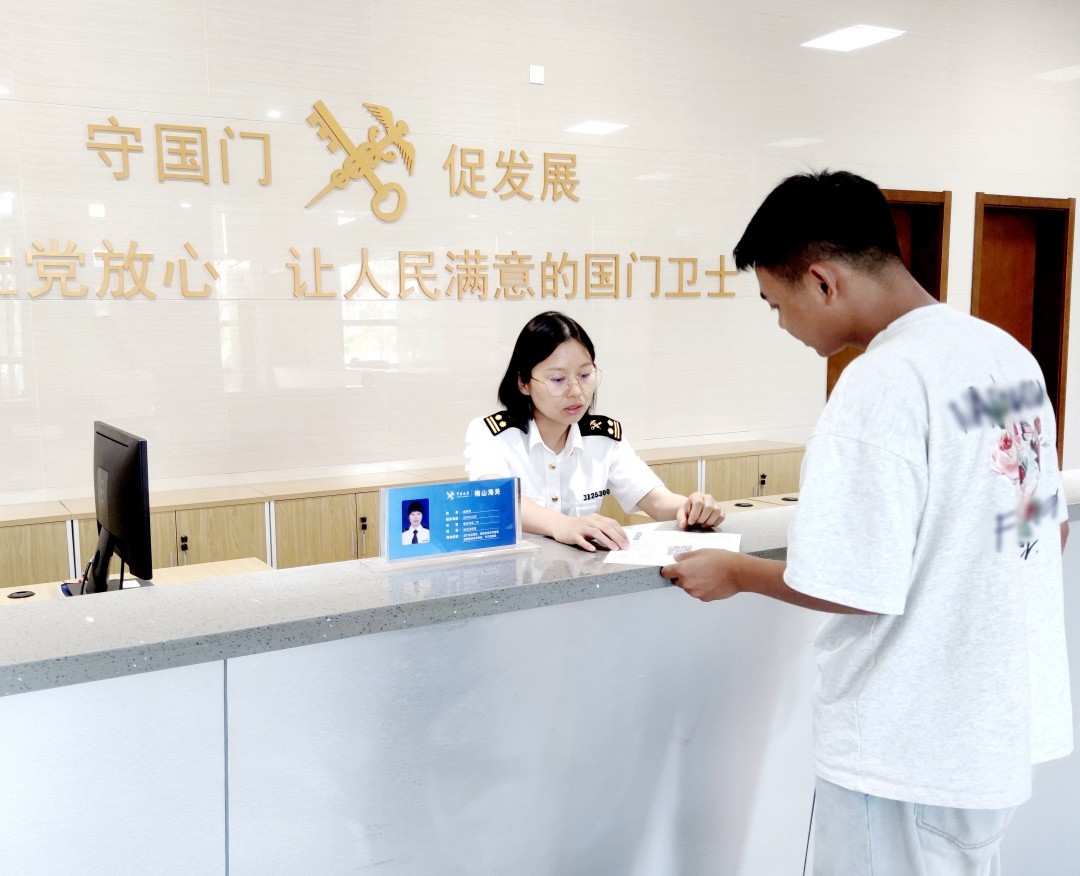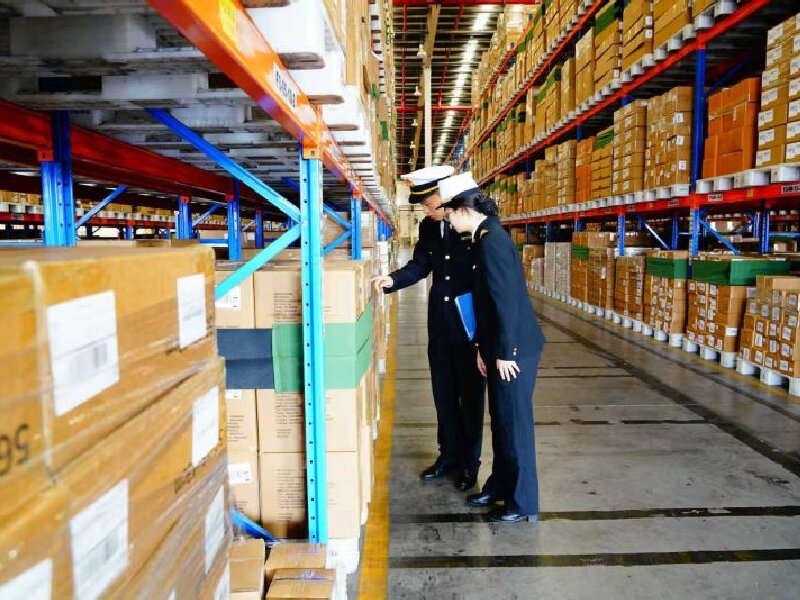Recently, a ship loaded with Polish flour docked at Ningbo's Meishan Container Terminal, marking the port's first-ever import of Polish flour. This shipment of 11 tons of Gdańsk, Poland, flour is primarily intended for food baking in the Chinese market.
Following the customs declaration, officials from Meishan Customs affiliated to Ningbo swiftly coordinated with the enterprise, conducted document verification and onsite inspections in line with inspection and quarantine standards, and expedited the customs clearance process after securing approval. Subsequently, the flour was shipped to the Central and Eastern European Specialty Commodities Perennial Pavilion in Ningbo for retail display and sale.

Meishan Customs officers are briefing customs brokers on the import policies for goods from Central and Eastern European countries. Photographed by Zhang Qingyun.
Poland is China’s largest trading partner in the Central and Eastern European region, primarily exporting agricultural products. Poland, particularly the coastal city of Gdańsk, is one of Europe's major wheat producers. The region's fertile black soil yields wheat with high protein content and a rich aroma, making it ideal for baking bread, cakes, cookies, and other goods. This batch of Gdańsk flour represents a new Central and Eastern European product introduced by the Ningbo Gdansk Club. “This is the first time Polish Gdansk flour has entered the Chinese market, allowing residents to purchase high-quality Polish flour locally,” stated Wang Dongxing, the enterprise leader.
“Thanks to a series of trade facilitation measures introduced by Ningbo Customs, an increasing variety of high-quality Central and Eastern European goods are entering the Chinese market through Ningbo port,” remarked Wo Xiaofen, director of the Central and Eastern European Specialty Commodities Perennial Pavilion. The inaugural import of Polish flour has enriched the variety of Central and Eastern European agricultural imports, enabling consumers to directly experience baked goods made with this flour at the Gdańsk Baking Club located within the Central and Eastern European Specialty Commodities Perennial Pavilion.
Recently, Ningbo Customs has been advancing its Smart Customs initiatives by continuously enhancing the "One-stop Service for Imports from CEEC" with new guidelines for importing popular items like grains, automobiles, pet foods, and fruits, thereby increasing the accuracy of trade services with Central and Eastern Europe. In collaboration with local commerce departments, Ningbo Customs has conducted policy dissemination meetings for enterprises, intensifying interpretations of new entry policies for Central and Eastern European agricultural products, visiting enterprises to understand their import needs and challenges. It has also enhanced interaction channels between customs and businesses, facilitated more imports of high-quality agricultural products and foods from Central and Eastern Europe, and bolstered Ningbo’s position as the preferred gateway for these goods into China. In the first eight months of this year, trade between Ningbo port and Central and Eastern European countries totaled RMB 68.23 billion, with Poland accounting for RMB 28.76 billion of this total, marking a year-on-year increase of 7.1%.
Disclaimer:The above content is translated from Chinese version of cceeccic. The cceeccic version shall prevail.
Related News
From Market Entry to Top Seller: Romanian Sunflower Oil Levers CEEC Platform Into Chinese Market
2026-01-12
Since the beginning of 2026, the CEEC Products Permanent Pavilion has been organizing a diverse range of promotional initiatives under the theme "Shared Market, Export Opportunities in China".

"Made in Ningbo" Reinforces Industrial Chains While Accelerating Market Expansion in CEE
2025-12-31
During the same period, Ningbo achieved bilateral trade with CEE countries valued at 54.07 billion yuan, marking a 4.1% year-on-year increase.

"Smart Supervision Plus Policy Push" Drive Ningbo's Cross-Border E-Commerce Exports Past 5 Billion Yuan Mark
2025-12-18
According to official statistics, in the first 11 months of this year, Ningbo's cross-border e-commerce exports from special zones exceeded 5 billion yuan, reaching 5.393 billion yuan, up 20.73% year-on-year and ranking first nationwide.

Ningbo Manufacturers Push into Central, Eastern Europe to Fortify Supply Chains
2025-12-16
During the same period, Ningbo's trade with CEE countries hit 54.07 billion yuan, a 4.1% year-on-year rise.

Boosting High-Quality Cooperation Between China and CEE Countries
2025-12-04
Ningbo, home to China's first China-CEEC Economic and Trade Cooperation Demonstration Zone, achieved a high average annual growth rate of 20.1% in trade with CEECs during the 14th Five-Year Plan period.
Ningbo Customs Drives Customs cooperation between China and CEECs, Achieving Signature "3-2-1" Outcomes
2025-11-04
Looking back on the 14th Five-Year Plan period, Ningbo Customs has closely followed the national strategy of high-level opening-up, continuously strengthening the China-CEEC Customs information cooperation initiative.
.jpg)
Ningbo's Trade with CEECs Tops 45 Billion Yuan in First Three Quarters
2025-10-27
According to Ningbo Customs, in the first three quarters of this year, Ningbo's bilateral trade with CEECs reached 45.45 billion yuan, a 7% year-on-year increase, outpacing the city's overall trade growth by 3.3 percentage points.
Ningbo's Foreign Trade Volume Exceeds One Trillion Yuan in Q1-Q3
2025-10-20
According to Ningbo Customs, Ningbo's total foreign trade volume for the first three quarters of this year exceeded 1 trillion yuan, reaching 1,092.26 billion yuan, an increase of 3.7% over the same period last year.
Hot News